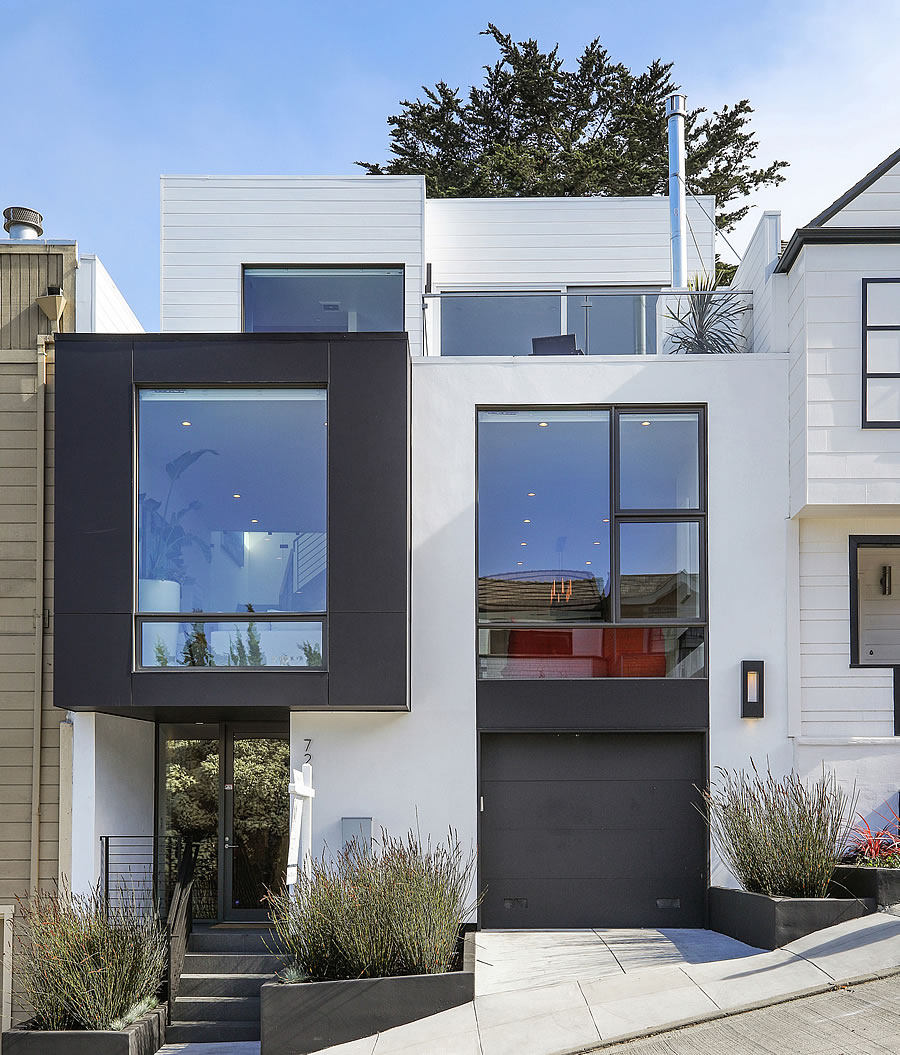Designed by Zack | de Vito Architecture, the “spectacular Noe Valley home” at 725 Duncan Street, which features “stunning Downtown, Bay, and Bridge views, paired with dramatic modern architecture and design,” was purchased for $4.1 million in January of last year.
The buyers further upgraded the 3,200-square-foot home, adding a custom designed gas fireplace in living room, a designer staircase and railings, high-end wood panels in the kitchen and a whole host of other functional (closet) and cosmetic (landscaping and tile) additions.
This past September, the upgraded home returned to the market listed for $4.25 million, a sale at which would have represented total appreciation of 3.7 percent over the past 20 months, not accounting for the six-figure cost of the upgrades and despite the fact that the “median sale price” in San Francisco is “up 29.7 percent!” since January of 2017.
And yesterday, the sale of 725 Duncan Street sold for $4.1 million, representing total appreciation of 0.0 percent for the spectacular Noe Valley home over the past two years. But again, that’s not accounting for the cost nor the value of the aforementioned upgrades.







Don’t forget the commission paid to the real estate agents.
While both transaction and holding costs are certainly relevant when calculating return on investment, they’re irrelevant when modeling appreciation of the asset and/or market.
What’s a quarter of a million dollars between friends?
Another bland hi end Ikea cubicle home.
You know all those bland souless boxes built all over the City in the late 60’s and 70’s – this is the 21st century version of those and they will not age well.
yup that is how i see this as well.
Yep. Modern version of the boxes built in the 60s and 70s. Although these have “luxury” materials.
This seems as if it was not intended as a flip – certainly not given the original asking price of 4.25 million which may have been set to cover the cost of the improvements made by the owners. Most likely the owners intended to stay in the home for a while but something unexpected happen. Possibly a job offer in another metro such as LA or Seattle. A case of domestic out-migration from SF. Imagine what half the asking price would get the owners in LA. – a short term loss on this home making it all worthwhile.
We have to admit, that’s a rather spectacular rationalization for why a complete lack of appreciation and six-figure loss is actually a good thing if you’re currently selling your home in San Francisco.
It’s not a rationalization. This does not look like a flip. My guess is that the owners planned to stay longer but something unexpected happened – life happens after all. They may have purchased at the top and they may be getting out near the top. All in all, depending on the specifics, not the end of the world for them.
Anyone buying a home for personal use should always be planning on living there 5, 6, 7 years or it does not make financial sense. Especially in a market like SF/the Bay Area which is possibly poised for an extended period of at best anemic appreciation.
And at least they fared better than the sellers of the remodeled home at 492 Douglass, which recently re-sold for $4.3 million having been purchased for $4.6 million in August of 2017.
It’s amazing how many people now appear to be taking strategic losses, despite the median sale price in San Francisco being “up 13 percent over the past year alone!”, and moving to LA.
You won’t get an argument from me that home prices have peaked and in some cases there has been a loss. Per tipster’s info this indeed may have been done as a strategic loss.
The market has peaked? Based on a quick query of recent comments, it would appear that it was just a week ago that you were personally doubling down on a prediction that “Bay Area home appreciation [will] mirror the national average,” which is currently running around 6 percent per year and would actually be above the long-term average for San Francisco.
Also, there’s the possibility that some people are rich enough that they just plain don’t care how much they get for a place…. sometimes they just decide they want to move, and can afford to do so without caring about taking a loss. i know someone who has bought and moved into 6 $10m+ houses in 15 years. He and his family don’t care about the money, in fact they take a loss on every place, given how much they rework every house… they just want to move until they find the place that’s perfect for them, as crazy as that sounds to you and me.
Then why don’t they (just) rent it out ’til they get a better price?
And if you’re answer is “it’s too much work and/or they don’t really care about money” then my thought is “how the **** do people with that attitude get so much money in the first place?”
The Condo Market peaked over the Summer. It’s tanking now
IIRC the condo market peaked in late 2015. It has recovered a bit but is still below it’s 2015 numbers. So it’s down somewhat, but not crashing.
Let’s hope Dave continues to follow the fortunes of these mythical owners and can tell us of their next turn of good fortune: a job offer in Boise or Minot ND, so they can double down – actually “half-down” – on their investment in LA/Seattle.
The former owner is retired, had three homes around the country, and probably got told by his accountant during his September tax planning conference to ditch the one with the highest non-deductible property tax. He’s saving $500,000 over the next ten years in property taxes, and it’s hard to justify holding more houses than you need when the long run of cheap money is coming to an end. Just putting that money into T bills will get you $1.6M in the next ten years at 4 percent.
So he puts $2.1M in his retirement account by walking away from a house he’s probably only rarely using.
I expect to see more and more of these discussions as the year ends.
I think they call that a strategic loss!!
As property taxes continue to creep up coupled with the $10K annual deduction cap, it makes sense to offload second or third homes. Unless we can get a Republican governor who can cut a deal with Trump on this issue, property taxes, particularly the additional assessments from ballot measures, will only go out exponentially.
Just got back from Singapore and it is a city state that knows how to do business and how to have an excellent quality of life. Obviously, the more money you have, the better the life. But it is really about opportunities from basic no frills to ultra high end that a person could still manage a high degree of satisfaction and happiness. Chances are high I would buy something there than another property here.
“Unless we can get a Republican governor” We’re more likely to see a consensus view (on SS) that real estate is a bad investment (which is to say we’re dealing with sub-atomic probabilities here.)
As for Singapore, it’s an authoritarian state that places a high value on order, and prays daily that China doesn’t decide to turn it into a landing strip (‘cuz the Toilet Police are no match for the Red Army). I think few here would wish to have that…tho the city itself could do a little to emulate that “orderly” part.
“As property taxes continue to creep up”
What’s the basis for this claim?
Way too humid for Singapore to have a high quality of life, IMO.
Personally I wasn’t too impressed when I visited, which was about 20 years ago now.
I got the sense people were “polite” to one another/visitors because they had told to be, while by comparison, the Malaysians seemed friendly because they were genuinely warmer and welcoming..
They used all the money to install a custom gas fireplace, but couldn’t upgrade the range to gas? Am I seeing that right?!
Easier to clean if you actually cook.
If you “actually cook”, you’re going to want gas.
I’ve never lived in Noe Valley, but I just tend to think that the hoity-toity types that are going to spend $4.1 million on a home like this one aren’t too concerned about ease of cleaning their range. They’ll hire that task out.
Likely an induction cooktop, not electric, which some people prefer to gas.
[Editor’s Note: A SocketSite Smackdown: Gas Versus Electric In The Kitchen]
From 12 years ago. Has anything changed?
yup, we got an induction cooktop in our new kitchen. Fast, easy-to-clean, timers on individual burners, it can even automatically heat the oil to the right temp (with special skillets). And can be solar-powered. Needs 40A breaker though, so may not work for older homes without upgrading the electrical.
The market is shifting hard and fast, those inflated prices of yesterday are long gone. Multiple offers with silly money on properties not even worth it are over. Sellers need to really take into consideration pricing a home accordingly to actually sell in todays market. Without price reductions and adding extra time on the market and holding costs. For buyers unfortunately even as prices settle to a new normal as the interest rates continue to rise it can become a Wash anyway… 3.5% in 2016 just below 4% a year ago now at 5. To put into perspective a $1M mortgage at 4% costs 4,774 month, at 5% costs 5,368 a month ! Slated to continue rising…
Yes and spreads on MBS indicate that mortgage rates could rise faster than treasury yields. It’s amazing how the typical seller and their realtors have no clue what interest rates have done to monthly payments since the spring. I’m also seeing tons of low down payment conventional loans right now, seems like all the well qualified buyers have already spent their money.
I think that’s a bit much. I think we’re experiencing more like a period of uncertainty based upon interest rates, stock market volatility, seasonality, and importantly though often overlooked, all time high construction costs stemming from tradespeople labor availability and raw materials costs. And all these things themselves have come during a relative price plateau. However, the core fundamental economics of the United States and the local Bay Area region remain strong. And if you look at various sectors within the market we’re not seeing anything that would indicate “hard” or “fast.” The market does not resemble anything at all like the previous hard and fast shift. When things trade they trade for at or near all time highs, such as this Duncan property purchased in January 17. Yes, short term sellers can or will take sizeable losses in these scenarios, however.
If you peel back the layers, those “core economic fundamentals” are built on staggering record levels of cheap debt, which will need to be paid back, much of it at higher interest rates, functioning as a drag on future growth. The new CAR report says that August inventory for the Bay Area was up 34% YoY. That’s a huge shift sorry. Meanwhile sales were down 7%, negating the realtor line we’ve been hearing for several years, that low sales volume is due to low inventory.
Peel back the layers then. What do you mean precisely?
Inventory is up, yes. Are prices down much? For me, no, they’re not, if at all. And many parts of San Francisco and the Bay Area in general are well up YoY. Look at the house in this thread. What did they do to add value, really? only subjective things. And it traded for the same amount. Granted just an anecdote. But so is your synopsis of what things mean or don’t mean.
What part of massive debt don’t you understand? You can look at public, private, consumer, corporate (this is the dangerous one right now). You can look at absolute terms, or in relation to income, EBITDA, tax receipts, GDP, doesn’t matter. Just open Bloomberg and type debt into the search bar.
I could look like I’m really living the good life, if I were taking out $75k per year on my credit cards. But as anyone with student debt will attest, the debt also creates a drag on your ability to actually get ahead. It’s no different when a company or the government borrows. Especially if you are using the money on frivolous short term things.
As for prices, it’s going to take a while. The market just started slowing down in August, so those over priced homes are just starting to hit the 90 day zone. Many of these sellers will just pull the house off the market, but you’ll also start seeing the lower prices start to creep in slowly. Market tops are a process, not a single point.
I already spoke to interest rates in the first place though. Do you foresee prime rates into the 7’s? To me that would be the mark. That would go past the rates we largely saw during past bull markets. Also, feel free to lose the dismissive and pointed tone when you exchange thoughts with yours truly. I will only ever read it as poor writing. If you can’t express a contrary opinion or argument without escalating tone you don’t have any business talking to strangers on the internet, IMO.
UPDATE: One Percent Appreciation for a Modern Noe Valley Home